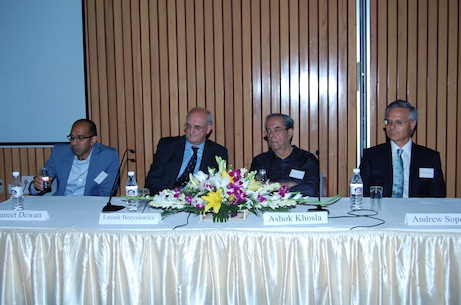
Gates Cambridge Alumni in India hosted a successful emerging leadership summit this week, with environmentalist Ashok Khosla being the keynote speaker.
The rich have most to lose from unequal growth, a leading environmentalist told a Gates Cambridge Alumni Emerging Leadership Summit in New Delhi this week.
Dr Ashok Khosla, a recipient of the United Nation’s Sasakawa Environment Prize (equivalent to the Environment Nobel), Chairman of Development Alternatives and a scientific advisor to the Indian government, was keynote speaker at the event. He said that an unequal distribution of wealth and malnutrition is linked to poor economic growth and terrorism and said policies needed to be developed to deal with corruption. He added that social enterprise was the best way to tackle poverty in rural areas and that great universities had a vital role to play in the formation of leaders and sharing knowledge that could contribute to development.
He said: “Great universities build thinkers, leaders and support knowledge creation and sharing and contribute to nation building.”
The event was attended by nearly 60 delegates, including Gates Cambridge Scholars elect, international NGO representatives and principal secretaries of the Government of India. Guest of honour was Professor Leszek Borysiewicz, Vice-Chancellor of the University of Cambridge and a Gates Cambridge Trustee. He praised the Gates Cambridge Scholarship programme and its aim of building a global network of future leaders. He stated: “Leadership is the capacity to bring different individuals together to make a difference.”
Others speaker at the event included Dr Puneet Dewan from the Bill & Melinda Gates Foundation, who spoke about the importance of improving the quality of healthcare. Professor M S Raghavendra, a Gates Cambridge Alumnus from the Administrative Staff College of India, spoke about water sanitation in urban areas and rainwater harvesting. He said India roughly accounts for 2.4 % of the world’s land mass, 4.5 % of the world’s fresh water resources and 16.7 % of the world’s population. He said: “Growth in urbanisation has outpaced the ability to provide adequate housing and urban infrastructure.” He added that a McKinsey report estimated that Indian cities will require US$ 1.2 trillion of additional capital investment by 2030.
On rainwater harvesting, he said it was time to move beyond collection of rooftop water and establish rain centres in all district HQs and cities with a population of more than one million. He suggested dual pipe technology, i.e. separate sewage and rainwater run-off collection pipes, could contribute to 30% of India’s water security requirements.
Rural issues
Rahul Nayar from the Office of the Adviser to the Prime Minister of India said the way in which rural India is governed is about to change due to the introduction of a national optical fibre network and the sharing of public information online which would lead to more transparency in governance. He hoped such initiatives could help in establishing larger network of community-driven, collaborative governance in the longer term.
Professor Mohita Bhatia, Assistant Professor at the School of Social Sciences of Jawaharlal Nehru University, spoke of the need to include marginalised communities in regional tensions in Jammu and Kashmir and said they had to be treated equally in terms of funding and development.
Andrew Soper, a counsellor at the British High Commission in New Delhi, argued for the importance of future Indo-UK cooperation in a wide range of areas. Issues raised from the floor during discussions included whether poverty alleviation is a moral cause rather than a developmental issue and whether there is an overconcentration of India’s leaders in urban areas when most of its grassroot challenges lie in rural areas.
Gates Cambridge Alumnus Vijay Kanuru, GCAA board member, founder and CEO of Applied Nanomaterials Pvt Ltd and a senior consultant of Cambridge Innovation Consulting, is the Executive Chairman of the organising committee and initiator of the event. He said: “The summit not only facilitated intellectual encounters and fostered collaborations between like-minded individuals, but also engendered new ideas and inspired people to act on global issues. In an increasingly interdependent globalised world underpinned by a modern economy and IT revolution, the political barriers are blurring. Energy security, healthcare, environment, infrastructure, social development and governance are the concerns of every citizen in the world. I call this an era of interdependence and cooperation. I hope this interdependence can be leveraged to create a united and better world. This aim is the founding spirit of the Gates Cambridge Scholarship.”
Another alumnus Sushil Saigal, Institutional Development & Governance Advisor Forest-PLUS Programme, who chaired the session and has just completed his PhD in Geography, stated: “The aim of this event was to provide a platform for emerging leaders in different fields to share their ideas. The event acted as a catalyst for a long-term interaction among a network of young and dynamic leaders that could potentially result in interdisciplinary solutions to the multifarious challenges facing our society.”
*The information in this article was supplied by Rahul Koul and Vijay Kanuru












